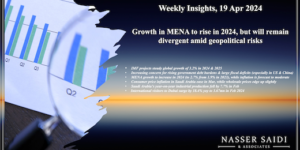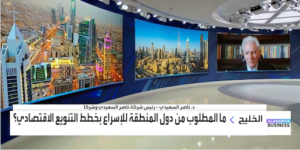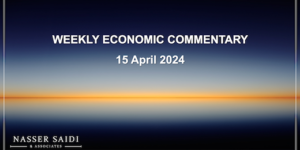Markets
Global stock markets were badly hit by fears that the end to ultra loose monetary policy on both sides of the Atlantic will drive down equity prices. Bond yields on the other side hovered near recent highs. The sell-off was triggered by top officials of the European Central Bank, the Federal Reserve, the Bank of England and the Bank of Canada who warned that the rock bottom of negative rates and QE programs are almost over. However, regional markets were buoyant benefiting from the rebound in oil prices. Among currencies the dollar took a severe blow from the sell off in asset markets, while the gold price was almost stable. Oil markets were on a roll with six consecutive days of gains, the longest streak since Apr, as drops in the US crude production and gasoline supplies wiped out the narrative of a global glut.
Global Developments
US/Americas:
- The final reading for the US Q1 GDP put real growth at 1.4% qoq ann, compared to earlier estimates of 1.2% and 0.7% and the 2.1% growth in Q4.
- US nominal personal income rose 0.4% in May vs 0.3% in Apr. Disposable nominal income growth also picked up to 0.5% from 0.2% in Apr. However wages and salaries growth decelerated from 0.5% mom in Apr to just 0.1% in May.
- The US PCE deflator fell -0.1% mom (1.4% yoy) in May after rising 0.2% (1.5% yoy) in Apr, the second decline in 3 months, signaling that inflation pressures remain weak and erratic.
- Initial jobless claims in the US added 2,000 units to 244,000. The four-week moving average fell 2,750 to 242,250. Continuing claims rose 6,000 to 1.948 mn.
- The US Case Shiller nationwide house price index rose 5.5% yoy in Apr slightly down from 5.6% in Mar.
- The US pending home sales index fell -0.8% mom in May, the third consecutive monthly fall.
- New US orders for durable manufactured goods plunged -1.1% in May after raising 0.7% in Apr, due mainly to non-defense aircrafts.
- The Central Bank of Mexico hiked its reference rate to counter inflation by 25bps to 7%.
Europe:
- The Eurozone’s inflation rate declined to 1.3% yoy in Jun from 1.4% in May due to lower oil price growth and the euro’s appreciation. Core inflation accelerated to 1.2% in Jun from 1% in May. Inflation should accelerate again once the effect of energy prices ebbs.
- The Eurozone’s M3 money supply grew 5% yoy in May almost in line with the 4.9% recorded in Apr. Growth in M1 stood at 9.3% in May, the same rate as in Apr. Private sector credit growth was also unchanged in May at 3%.
- The Eurozone’s economic confidence indicator increased to 111.1 in Jun from 109.2 in May, close to a 10-year high, thanks to strong results in industry, retail trade, construction and consumption.
- German retail sales gained 0.5% mom in May vs -0.2% in Apr confirming that consumption is a stable component of GDP growth.
- The German Ifo Business Climate Index touched a record at 115.1 in Jun from 114.6 in May.
- UK consumer confidence in June dived again to -10, from -5 in May, just 2 points above the post-referendum low. All five subcomponents took a beating, with consumers turning particularly pessimistic.
- The UK nationwide housing price index growth rebounded to 3.1% yoy in Jun from 2.1% in May but still below the 4.9% average growth in 2016.
Asia Pacific:
- China’s official PMI rose to 51.7 in June from 51.2 in May with manufacturer’s penciling in higher foreign and domestic orders.
- Japan’s core CPI inflation was 0.4% yoy in May vs 0.3% in Apr, thanks to higher energy prices. Core-core inflation, which excludes fresh food and energy, remained flat.
- Japan’s industrial output fell -3.3% mom, the worst plunge since 2011, (+6.8 yoy) in May after 4% (5.7% yoy) in Apr. Traditional manufacturing, including the auto sector performed worse than expected as firms expect flat domestic demand.
- Japan’s retail sales rose 2% yoy in May, after a 3.2% increase in Apr pushed up by fuel costs.
- Korea’s industrial production growth slowed to 0.1% yoy in May from 1.7% in Apr due to the weakening of the tech cycle.
- Hong Kong’s trade balance fell to -HKD 35.6bn in May after -HKD 34.1bn in Apr due to a slowdown in yoy export growth for the fourth consecutive month, but the overall situation remains positive thanks to strong demand from China.
Bottom line: Macro data this week confirm that the resilience in manufacturing activity in China gives a much needed support to the global economy in conjunction with positive surprises from Euroland and timid signs of a pick up in Japan. On the other side the US economy in the first half of the year has not fulfilled the expectations of a robust acceleration and the political uncertainty is exacerbating the difficulties for business and investors in planning for the medium term.
Regional Developments
- The deadline set by Arab States for Qatar to comply with its demands is tomorrow (Monday): fresh sanctions are expected to be imposed if demands including reducing ties to Iran and shutting down Al Jazeera are not met. Qatar’s CDS spreads were at a 16-month high on Friday, and offshore trade of the QAR has become volatile and illiquid.
- On Jun 21st, Saudi Arabia announced Mohammed bin Salman as the new Crown Prince. State media reported that 31 of the 34 princes in charge of succession approved the change.
- Egypt hiked fuel prices for the second time after the currency floatation: price of the most used fuel category was raised by 55% to EGP 3.65 per litre while price of cooking gas cylinders doubled to EGP 30. This move is expected to reduce subsidies this fiscal year to EGP 110bn from last year’s EGP 145bn. Separately, the President has doubled monthly food subsidies to EGP 50 per person from EGP 21 previously.
- Money supply (M2) in Egypt grew by 39.4% yoy in May to EGP 2.85 trillion.
- A EGP 75bn social package has been included in Egypt’s 2017-18 budget: this includes a 15% rise for pensioners and a 14-20% rise in salaries; budget deficit is expected to stay at 9.1% in spite of this addition, according to the finance ministry.
- Egypt’s parliament voted to raise the minimum income tax threshold to EGP 7,200 (USD 400) a year from EGP 6,500 and gave tax breaks to the first three brackets. Around 15 million families are likely to benefit from the measures.
- Remittances from Egyptians abroad increased by 11.1% since the currency float in Nov to reach USD 9.3bn as of end-Apr.
- Egypt is likely to receive the second disbursal of the USD 12bn IMF loan within two weeks; the payment has been slightly delayed due to bank procedures and the IMF executive board meetings, according to the Finance minister.
- Egypt’s President approved the stamp duty on stock exchange transactions as well as extending a freeze on capital gains tax for three years. The stamp duty, set at EGP 1.25 per 1,000 for the first year, is now in place and will rise to EGP 1.5 and EGP 1.75 in the second and third year respectively.
- Egypt recorded a 51% yoy increase in tourist arrivals in Jan-Mar 2017. This was identified as a positive factor for Egypt’s banks according to Moody’s given that it enhances repayment capacity of its borrowers.
- GDP in Jordan grew by 2.2% in Q1 this year, supported by the increase in tourism revenues, expatriate remittances and total exports.
- Public debt in Jordan touched JOD 26.2bn in Jan-Mar, accounting for 94.1% of GDP and this debt-GDP ratio is set to rise to 95.1% by end of this year.
- Jordan’s tourism revenues were up by 15.4% to USD 1.8bn during Jan-May, thanks to a 10.5% rise in tourists.
- Construction licenses issued in Jordan increased by 15.8% yoy to 13,118 in Jan-Apr this year.
- Expatriates in Kuwait will have to pay up to KWD 1700 annually for parents’ residence, including medical insurance and other fees.
- Lebanon’s industrial exports plunged by 5.9% yoy to USD 596.6mn in Q1 this year; the most exported products were machinery, electrical appliances and equipment, followed by food and tobacco products as well as ordinary metals and their products.
- The Oman Fund for Development of Youth Projects SAOC (Sharakah) will raise its financing limit from OMR 200,000 to 350,000 and extend the maturity of its loans.
- Qatar’s bank merger between Masraf Al Rayan (the acquiring bank), Barwa Bank and International Bank of Qatar is going ahead as planned; valuation will be completed in the coming weeks and the merger will be finalised by end of the year. The new bank will have assets around QAR 160bn.
- Over USD 30bn worth of domestic equity holdings (including stakes across the banking industry) held by Qatar’s sovereign wealth fund has been transferred to the finance ministry, reported Reuters, citing sources.
- GDP growth in Saudi Arabia declined by 0.5% yoy in the Jan-Mar quarter, registering the first fall since 2009, as a result of the 2.3% dip in the oil sector and a shrinking non-oil government sector (-0.1%). The non-oil private sector reported a 0.9% growth, up from the previous quarter’s 0.5%, and the fastest expansion since Q4 2015.
- Saudi Arabia’s CDS spreads rose to the highest level since mid-Jan, with a reading of 114bps mid-last week as the diplomatic row with Qatar continues.
- Restoring Saudi Arabia’s civil servants allowances retroactively back to Sep will cost SAR 5-6bn, revealed the finance ministry. This works out to be only 0.6-0.7% of budgeted state spending this year or almost 0.2% of GDP.
- MSCI disclosed that it would consider upgrading Saudi Arabia to emerging market status – the decision would be announced in Jun 2018 and any upgrade would come into effect in May and Aug 2019, in two phases.
- Saudi Arabia plans to operate water and sewage projects across five regions in the country, estimated to cost SAR 146.7mn (USD 39.2mn).
- Dubai and Abu Dhabi feature in the top 25 costliest cities to live and work in, according to the latest global survey by Mercer. While Riyadh (52), Manama (55), Doha (81) and Muscat (91) feature in the top 100, Cairo had the lowest ranking in the Middle East at 183. The list was topped by Angola’s capital Luanda, followed by Hong Kong and Tokyo.
UAE Focus
- Money supply in the UAE increased by 0.6% mom in May this year; the biggest gain came from an increase of 0.9% recorded in gross bank assets.
- Fuel prices in the UAE are lower in Jul: petrol prices announced for this month are lower by 5.1-5.6% mom depending on the grade, while diesel price is 3.2% less.
- The UAE Clearing Cheque System handled a total of 12.9mn cheques worth AED 643.7bn in Jan-May 2017, according to the central bank. The value of dishonoured cheques fell by 7.3% yoy or AED 2.3bn during this period from AED 31.22bn a year ago.
- The total number of millionaire households (those with more than USD 1mn in net investable assets) in the UAE increased by 5.9% in 2016, according to BCG’s Global Wealth 2017 report. The report also found that private wealth held by ultra-high-net-worth households (those with above USD 100mn) in the UAE grew by 8.8% last year, while the upper HNW segment (USD 20-100mn) posted 11.2% growth.
- According to UAE’s minister of energy, the country’s new energy strategy is set to save up to AED 700bn by 2050.
- Bilateral trade between UAE and Jordan touched USD 1.8bn last year, with re-exports accounting for almost half of the trade at USD 840mn.
Media Review
Oil prices rebound strongly
https://www.bloomberg.com/news/articles/2017-06-28/oil-holds-gains-as-u-s-crude-production-plunges-most-in-a-year
India’s major tax reform GST is introduced
https://www.ft.com/content/a7fa24b6-570b-11e7-9fed-c19e2700005f (paid content)
https://www.bloomberg.com/news/articles/2017-06-29/-plenty-of-hiccups-expected-as-india-rolls-out-new-tax-reform
World food security risks growing: Chatham House
https://www.chathamhouse.org/publication/chokepoints-vulnerabilities-global-food-trade#
Prospects for the world’s biggest IPO
https://www.economist.com/news/business/21723872-saudi-aramco-cannot-be-seen-isolation-kingdom-it-funds-prospects-worlds
The mysterious (and continuing) fall in Saudi foreign reserves
https://uk.reuters.com/article/uk-saudi-economy-reserves-analysis-idUKKBN19I17R
Dependent fee looms large on expats in Saudi Arabia
http://saudigazette.com.sa/saudi-arabia/dependent-fee-looms-large-expats-ksa/
Powered by:







